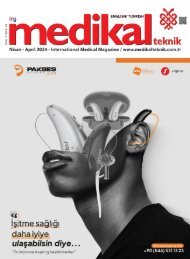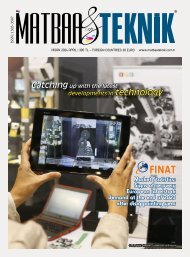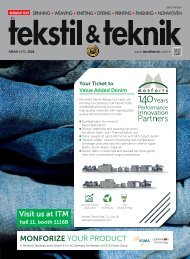Create successful ePaper yourself
Turn your PDF publications into a flip-book with our unique Google optimized e-Paper software.
1
Monthly automotive aftermarket magazine<br />
GROUP CHAIRMAN<br />
H. FERRUH ISIK<br />
PUBLISHER:<br />
İstmag Magazin Gazetecilik<br />
İç ve Dış Ticaret Ltd. Şti.<br />
Managing Editor (Responsible)<br />
Mehmet Söztutan<br />
mehmet.soztutan@img.com.tr<br />
Advertising Sales Consultant<br />
Adem Saçın<br />
+90 505 577 36 42<br />
adem.sacin@img.com.tr<br />
EDİToR<br />
Mehmet Soztutan, Editor-in-Chief<br />
mehmet.soztutan@img.com.tr<br />
Enes Karadayı<br />
enes.karadayi@img.com.tr<br />
International Marketing Coordinator<br />
Ayca Sarioglu<br />
ayca.sarioglu@img.com.tr<br />
Competitive and innovative…<br />
Advisory Editor<br />
Yusuf Okçu<br />
yusuf.okcu@img.com.tr<br />
Finance Manager<br />
Cuma Karaman<br />
cuma.karaman@img.com.tr<br />
Digital Assets Manager<br />
Emre Yener<br />
emre.yener@img.com.tr<br />
Technical Manager<br />
Tayfun Aydın<br />
tayfun.aydin@img.com.tr<br />
Graphic & Design Advisor<br />
Sami aktaş<br />
sami.aktas@img.com.tr<br />
Accountant<br />
Yusuf Demirkazık<br />
yusuf.demirkazik@img.com.tr<br />
Subsciption<br />
İsmail Özçelik<br />
ismail.ozcelik@img.com.tr<br />
HEAD OFFICE:<br />
İstmag Magazin Gazetecilik<br />
İç ve Dış Ticaret Ltd. Şti.<br />
Ihlas Media Center<br />
Merkez Mah. 29 Ekim Caddesi No: 11B / 21<br />
Yenibosna Bahcelievler, Istanbul / TÜRKİYE<br />
Tel: +90 212 454 22 22<br />
www.img.com.tr sales@img.com.tr<br />
KONYA:<br />
Metin Demir<br />
Hazım Uluşahin İş Merkezi C Blok<br />
Kat: 6 No: 603-604-605 KONYA<br />
Tel: (90.332)238 10 71 Fax: (90.332)238 01 74<br />
The Turkish automotive industry have been able to consolidate and restructure its<br />
market share both at home and abroad. The exports by Turkish automotive sector,<br />
which is one of the major driving force of Turkish economy, reached remarkable<br />
figures in the last decade. Initially, the majority of the market development was<br />
based on imports and some level of local system integration. Turkey has become a<br />
crucial production platform for global automotive manufacturers.<br />
The proven success in the exports markets, however, depends on close technical<br />
links with industrialized countries and the willingness of their foreign partners to<br />
integrate their Turkish counterparts into their production-distribution networks as<br />
regular suppliers of high quality, low-cost components.<br />
Turkish producers of automotive parts and components have attained high<br />
standards reflected by large export volumes to many industrialized countries.<br />
There are numerous producers of automotive components and services in Turkey.<br />
More than half of these manufacturers compete in global markets and set high<br />
standards of export figures.<br />
The Turkish automotive supplier industry produces almost all types of parts,<br />
components and spare parts such as engines and engine parts, power train parts<br />
and components, brake and clutch parts and components, hydraulic and pneumatic<br />
systems, suspension systems, security systems, rubber and plastic parts, chassis,<br />
frames and parts, casting and forging, electrical equipment and parts, lighting<br />
systems, accumulator batteries, seats etc.<br />
As known, our publications remain at the service of those businesses people<br />
seeking to increase their share in the increasingly competitive foreign markets.<br />
This month, we participate in Autopromotec <strong>2023</strong>, Bologna, the specialized<br />
international exhibition of automotive equipment and aftermarket products, As for<br />
the next month, we will participate inAutomechanika Istanbul, Eurasia’s number<br />
one OEM and aftermarket event. It brings together all relevant professionals from<br />
the automotive manufacturing, distribution and repair sectors in the region and it<br />
provides opportunities for small and middle enterprises to step up in the market.<br />
We are convinced that the events would be instrumental to increase business<br />
opportunities in the automotive industry as usual.<br />
We wish all business people success and lucrative business.<br />
PRINTED BY:<br />
İHLAS GAZETECİLİK A.Ş.<br />
Merkez Mahallesi 29 Ekim Caddesi İhlas Plaza<br />
No:11 A/41 Yenibosna–Bahçelievler/ İSTANBUL<br />
Tel: 0212 454 30 00<br />
www.ihlasmatbaacilik.com<br />
automotiveexport<br />
automotiveexports
Autopromotec<br />
<strong>2023</strong>, Bologna<br />
offers new<br />
opportunities<br />
The 30th edition of Autopromotec, the<br />
most specialized international exhibition<br />
of automotive equipment and aftermarket<br />
products, will be held <strong>May</strong> 21 – 24, <strong>2023</strong> at<br />
the Bologna Trade Fair Center.<br />
According to officials of the event,<br />
branded from its earliest beginnings as an<br />
“international exhibition”, Autopromotec<br />
(back then called SARP – Exhibition of<br />
Tyre Retreading Equipment) was born in<br />
1965 in Rome thanks to an AIRP (Italian<br />
Tyre Retreaders Association) initiative<br />
meant to give visibility to the technological<br />
developments experienced by the<br />
retreading sector in those years.<br />
In 1967 the exhibition, now held in<br />
Bologna, launched the biennial formula<br />
still popular nowadays. A new phase begins<br />
in 1973, and SARP is partnered with SIAC<br />
(International Exhibition of Equipment, Car<br />
repair garages and Car body shops), and in<br />
1991 the two exhibitions join together to<br />
form one, called Autopromotec.<br />
The big turning point occurs in 2005, when<br />
Autopromotec includes new product<br />
sectors such as spare parts, components<br />
and car service to embrace the whole<br />
automotive aftermarket.<br />
Autopromotec represents a selection of<br />
specialized trade shows where attendees<br />
can, thanks to the division of the show<br />
floor into sector-related halls, plan custommade<br />
visits based on their professional<br />
interests. The exclusive approach adopted<br />
by Autopromotec makes the show a<br />
showcase of cutting edge technologies,<br />
innovations, new products and market<br />
opportunities which are a benchmark for<br />
the sector.<br />
The exhibition has established an enviable<br />
reputation as a specialized, representative<br />
and professional event for highly<br />
qualified exhibitors (only manufacturers<br />
and authorized dealers) and, in its fiftyyear<br />
history, it has kept pace with the<br />
technological and professional growth of<br />
the automotive sector, becoming a mustsee<br />
for the supply and demand network.<br />
Autopromotec is the place where business<br />
opportunities turn into global networking<br />
strategies.<br />
<strong>May</strong> <strong>2023</strong> 10
4,870 electric car registrations in 1st quarter<br />
Electric cars’ share of new registrations in<br />
Türkiye more than doubled from 1.1% in<br />
January-March 2022 to 2.4% in the same<br />
period this year.<br />
During the first quarter of <strong>2023</strong>, 4,870<br />
electric cars were registered in Türkiye, the<br />
country’s statistical authority TurkStat said.<br />
In the three-month period, 460,910 road<br />
motor vehicles were registered in the<br />
country, including 204,666 cars.<br />
The share of gasoline-powered vehicles<br />
among registrations in the first quarter was<br />
at 66.6%, down from 70.5% in the same<br />
period last year.<br />
Diesel-powered vehicles’ share was up to<br />
20.5% from 16.5% over the same period,<br />
while hybrid cars’ share dropped to 8.5%<br />
from 9.5%.<br />
The share of LPG-powered vehicles also<br />
dropped to 2% from 2.4%.<br />
In Türkiye, as of the end of March, the<br />
number of road motor vehicles reached<br />
26.94 million; cars’ share was at 53.7%,<br />
small trucks 16.1%, motorcycles 15.9%,<br />
tractors 7.9%, trucks 3.5%, minibuses 1.8%,<br />
buses 0.8% and special purpose vehicles<br />
0.3%. The country’s first indigenous electric<br />
car brand Togg, which began to sell its first<br />
model T10X in the domestic market, is<br />
set to deliver 20,000 units of electric cars<br />
within this year.<br />
Over the last year, electric car registrations<br />
in the country totaled 8,312 units.<br />
<strong>May</strong> <strong>2023</strong> 12
Turkish unmanned jet Kızılelma,<br />
drone Akıncı conduct formation flight<br />
Türkiye’s homegrown unmanned fighter<br />
aircraft, Bayraktar Kızılelma, has achieved<br />
another milestone in its flight test<br />
campaign.<br />
According to a statement by the developing<br />
company, Baykar, the campaign is<br />
progressing as planned.<br />
During the ninth and 10th flight tests at<br />
the Akıncı Flight Training and Test Center in<br />
the Çorlu district of northwestern Tekirdağ<br />
province, Bayraktar Kızılelma, the country’s<br />
first unmanned fighter jet, successfully<br />
conducted a formation flight with Baykar’s<br />
Bayraktar Akıncı unmanned combat aerial<br />
vehicle (UCAV).<br />
This marks the first time that two<br />
unmanned aerial vehicles have flown<br />
together in formation.<br />
The Bayraktar Kızılelma project, which has<br />
successfully produced two prototypes,<br />
is currently in the development and<br />
production phase. As part of the<br />
TEKNOFEST <strong>2023</strong> event, the public will<br />
have the opportunity to see the aircraft at<br />
Airport from April 27 to <strong>May</strong> 1.<br />
Baykar plans to begin mass production of<br />
the national unmanned warplane by 2024.<br />
On April 10, the inventory acceptance<br />
ceremony of the Turkish Navy’s flagship,<br />
the TCG Anadolu, the world’s first UCAV<br />
ship, was held, where Bayraktar Kızılelma<br />
and Bayraktar TB3 UCAV were presented<br />
on the flight deck.<br />
The second prototype of Bayraktar<br />
Kızılelma Unmanned Fighter Aircraft was<br />
showcased at the event, with flight tests<br />
planned to commence from the TCG<br />
Anadolu in 2025.<br />
On April 17, the TCG Anadolu ship and<br />
Bayraktar Kızılelma and Bayraktar TB3 were<br />
opened for public visitation at Istanbul<br />
Sarayburnu Port. Tens of thousands of<br />
people visited the boat and had the<br />
opportunity to observe the aircraft on the<br />
flight deck.<br />
In 2021, Baykar launched the Bayraktar<br />
Kızılema Project, fully funded by its equity<br />
capital. On Nov. 14, 2022, Bayraktar<br />
Kızılelma, with the tail number TC-ÖZB was<br />
transferred to the Akıncı Flight Training and<br />
Test Center in Çorlu. Following successful<br />
ground testing, the aircraft made its<br />
maiden flight on Dec. 14, 2022.<br />
Bayraktar Kızılelma took to the skies in<br />
a record time of just one year. Recently,<br />
the aircraft achieved a major milestone<br />
by conducting eight flights, including four<br />
flights between April 18-20. During these<br />
flights, the plane underwent successful<br />
system identification and maneuvering<br />
tests at high speeds with its landing gear<br />
retracted.<br />
Bayraktar Kızılelma reached a speed of 630<br />
kph (390 mph) in these tests.<br />
Air-to-air combat<br />
The Bayraktar Kızılelma unmanned fighter<br />
aircraft is designed to conduct air-to-air<br />
combat missions with the assistance of<br />
artificial intelligence and air-to-ground<br />
missions. The aircraft’s low radar crosssection<br />
will give Türkiye a significant<br />
advantage in low visibility.<br />
Additionally, the aircraft’s unique ability<br />
to take off and land on ships with short<br />
runways will revolutionize the battlefield,<br />
allowing for increased flexibility and<br />
operational capability.<br />
Bayraktar Kızılelma, which has a take-off<br />
weight of 8.5 tons and a payload capacity<br />
of 1,500 kilograms (3,300 pounds), will<br />
also have high situational awareness<br />
with the national AESA radar. As a result,<br />
unmanned aircraft, which will use all<br />
nationally developed ammunition, can<br />
<strong>May</strong> <strong>2023</strong> 16
operate with intelligent fleet autonomy.<br />
Baykar has begun <strong>2023</strong> with a significant<br />
export contract for its Bayraktar TB2, valued<br />
at $370 million (TL 7.19 million), after<br />
outcompeting American, European and<br />
Chinese competitors in a rigorous selection<br />
process conducted by Kuwait’s Ministry of<br />
Defense. Since the inception of the UAV<br />
R&D process in 2003, Baykar has generated<br />
75% of its revenue from exports. In 2021, it<br />
became the leading exporter in the defense<br />
and aerospace industry, according to the<br />
Turkish Exporters Assembly (TIM) data.<br />
In 2022, Baykar achieved an export rate of<br />
99.3% and exported $1.18 billion (TL 22.91<br />
billion) worth of products, establishing<br />
itself as the top exporter in the defense<br />
and aerospace industry with a turnover<br />
of $1.4 billion. To date, Baykar has signed<br />
export agreements with 28 countries for its<br />
Bayraktar TB2 UCAV and six countries for<br />
its Bayraktar Akıncı, further cementing its<br />
position as a leading innovator and exporter<br />
in the field of unmanned aerial vehicles.<br />
<strong>May</strong><br />
<strong>2023</strong><br />
18
Türkiye launches Black Sea gas deliveries in<br />
historic milestone<br />
Türkiye started natural gas production<br />
from a vast reserve discovered in the Black<br />
Sea, which promises to curb the country’s<br />
external dependence and cut consumer<br />
energy prices.<br />
President Recep Tayyip Erdoğan green<br />
signaled the first delivery to an onshore<br />
plant, which will begin with 10 million cubic<br />
meters (mcm) of gas daily in the first phase.<br />
“This is a historic milestone for Türkiye’s<br />
path to energy independence,” Erdoğan<br />
told the ceremony held in northern<br />
Zonguldak province broadcasted live on<br />
television.<br />
Production will be increased to 40 million<br />
cubic meters of gas per day in the coming<br />
period, the president said, after other wells<br />
go into operation.<br />
“When we reach full capacity, we will meet<br />
30% of our country’s gas needs” from the<br />
Black Sea reserves, he said.<br />
In August 2020, the country discovered<br />
a reserve off the coast of Zonguldak,<br />
which Erdoğan hailed as a way to wean<br />
the country off its dependence on energy<br />
imports.<br />
Erdoğan announced that the country’s first<br />
drilling vessel Fatih had discovered 320<br />
billion cubic meters (bcm) of gas in the<br />
Tuna-1 well in the Sakarya gas field.<br />
<strong>May</strong> <strong>2023</strong> 20
The discovery went down to history as<br />
the largest gas discovery ever in Türkiye’s<br />
history, which thereafter only went on to<br />
be gradually revised upward.<br />
In late December 2022, the reserve was<br />
eventually predicted to hold around 710<br />
bcm of gas, the increase that Erdoğan said<br />
came mainly from the Sakarya field, where<br />
reserves are now seen at 652 bcm, and<br />
another 58 billion cubic meters found in an<br />
offshore field nearby.<br />
According to experts, 10 million cubic<br />
meters of gas per day in the first phase<br />
would meet around 6% of Türkiye’s annual<br />
consumption, which stands at 60 billion<br />
cubic meters. It will deliver a boost to<br />
the economy and cover a significant part<br />
of Türkiye’s energy needs, reducing its<br />
dependence on foreign sources while<br />
strengthening its hand on contracts with<br />
major gas-supplying countries. President<br />
Recep Tayyip Erdoğan poses for a photo<br />
near the Filyos Gas Processing Facility,<br />
Zonguldak, northwestern Türkiye, April 20,<br />
<strong>2023</strong>. (AA Photo)<br />
More than 8,000 personnel on land and<br />
over 2,000 at sea have worked tirelessly in<br />
three shifts for the past two years to bring<br />
the gas onshore.<br />
In June last year, Türkiye started the<br />
construction of an underwater pipeline<br />
connected to the seabed from the port of<br />
Filyos – around 400 kilometers (250 miles)<br />
east of Istanbul on the Black Sea coast.<br />
Free natural gas<br />
Meanwhile, Erdoğan also announced that<br />
natural gas used in kitchens and for hot<br />
water, equivalent to 25 cubic meters per<br />
month on average, would be provided free<br />
of charge for a year.<br />
He also said all households would be<br />
offered a month of free natural gas for<br />
domestic consumption.<br />
This could mean TL 30.8 billion (around<br />
$1.59 billion) in support for citizens’<br />
budgets.<br />
The process of extracting natural gas will<br />
proceed in stages. Some five of the 10 wells<br />
planned within the scope of the first phase<br />
will be commissioned after the ceremony,<br />
and the remaining five wells will be<br />
commissioned at the end of September.<br />
The second production phase is expected<br />
to start in 2026, and the third stage is<br />
scheduled to begin in 2028.<br />
As of the second phase, all household<br />
needs in Türkiye will already be covered by<br />
domestic gas.<br />
Satisfied buyer<br />
Oğuzhan Akyener, head of the Türkiye<br />
<strong>May</strong><br />
21 <strong>2023</strong>
Energy Strategies and Policy Research<br />
Center (TESPAM), expressed optimism<br />
about the contribution of Black Sea gas to<br />
the national economy.<br />
Akyener noted that the initial 10 mcm of<br />
gas per day could meet 5%-6% of Türkiye’s<br />
annual consumption.<br />
Akyener acknowledged that gas prices<br />
are dynamic and do not have a fixed<br />
mechanism.<br />
He referred to the fluctuating prices in the<br />
Energy Stock Exchange Istanbul (EPIAŞ),<br />
which rose to as high as TL 25 per cubic<br />
meter in winter and is currently around TL<br />
9-10.<br />
He estimated that the first production<br />
phase would yield TL 100 million per day<br />
based on today’s average EPİAŞ spot sales<br />
price of TL 10 per cubic meter and daily<br />
production of 10 mcm.<br />
He added that the income from the second<br />
phase could be around TL 400 million.<br />
An aerial view shows part of the Filyos Gas<br />
Processing Facility, Zonguldak, Türkiye,<br />
April 19, <strong>2023</strong>.<br />
Maintaining that the economic value will<br />
increase with the increase in natural gas<br />
production, Akyener said: “Assuming that<br />
we produce 3.5 bcm of natural gas per year<br />
and taking the spot market prices of EPIAŞ<br />
as an average of TL 10, the contribution of<br />
the first phase gas to the economy will be<br />
approximately TL 35 billion.<br />
Referring to the possible contributions<br />
of Black Sea gas to Türkiye in the winter<br />
months, Akyener said: “When prices<br />
increase in winter, it becomes difficult to<br />
find gas. Therefore, we buy spot natural gas<br />
at high prices from outside. But from now<br />
on, we may not have to buy spot natural<br />
gas from outside during winter.”<br />
The discovery will strengthen Türkiye’s<br />
hand on future trade deals, putting Ankara<br />
in a much more favorable position. Akyener<br />
said: “We will approach new natural gas<br />
contracts with a satisfied buyer’s eye. You<br />
renew the contracts as they expire. By<br />
saying, ‘I already have natural gas,’ you can<br />
cut prices on new contracts.”<br />
Russia has always been the most significant<br />
natural gas exporter to Türkiye – a country<br />
highly dependent on imports via pipelines<br />
and liquified natural gas (LNG) – followed<br />
by Azerbaijan and Iran.<br />
The country also met its energy needs with<br />
LNG purchases from various countries,<br />
including Algeria, Nigeria, Qatar, the U.S.,<br />
Trinidad and Tobago and Norway.<br />
In recent years, several positive steps have<br />
been taken to diversify the country’s supply<br />
channels and improve deals with trading<br />
partners. With a focus on infrastructure<br />
and LNG investments in gas storage<br />
and transmission, Türkiye had already<br />
succeeded in reducing its share of oil-based<br />
pipeline gas contracts.<br />
The country has started to reap the<br />
benefits of those investments this year,<br />
as it has benefited from lower LNG prices<br />
brought about by the pandemic by storing<br />
the cheaper purchases.<br />
The first steps of the natural gas<br />
exploration project were taken following<br />
the statements of then-Energy and Natural<br />
Resources Minister Berat Albayrak at the<br />
National Energy and Mining Policy Meeting<br />
held on April 6, 2017.<br />
“For the first time in our history, I hope we<br />
will dig at least two wells in the Black Sea<br />
and two in the Mediterranean every year<br />
with the exploration drilling ship we will<br />
purchase this year,” he said.<br />
Then on June 9, 2017, Albayrak visited the<br />
Barbaros Hayreddin Paşa seismic vessel,<br />
saying: “If we say Türkiye is now a great<br />
power, we have to be with our engineers,<br />
ships and exploration drilling platforms in<br />
this field as well. Hopefully, we will take<br />
important steps as a result of this.”<br />
On July 9, 2017, at the World Oil Congress,<br />
Albayrak said: “We have focused on oil and<br />
natural gas activities in our seas on the axis<br />
of exploration and production activities.<br />
Our seismic research continues intensively<br />
in the Mediterranean and Black Seas.”<br />
“There is now a Turkish Petroleum (TPAO)<br />
that will continue our drilling works at full<br />
speed in 2018 in the Mediterranean with<br />
our drilling ship, which we will add to our<br />
inventory before the end of this year,” he<br />
said at the 7th International Natural Gas<br />
Congress on Nov. 3, 2017.<br />
<strong>May</strong><br />
<strong>2023</strong><br />
22
Manufacturers hope for AI revolution to boost factories<br />
Manufacturers eagerly anticipate the<br />
advancements in artificial intelligence to be<br />
applied in their factories, envisioning using<br />
robots to repair and maintain intricate<br />
machinery.<br />
There has been an explosion of interest<br />
in using AI across many sectors since the<br />
launch last year of chatbot ChatGPT from<br />
U.S. startup OpenAI.<br />
And at Hanover Fair on industrial<br />
technology in Germany, the potential for<br />
artificial intelligence in the manufacturing<br />
sector was firmly in focus.<br />
Via the tablet in his hands, a young<br />
employee of American IT services provider<br />
HPE chatted with an AI-equipped virtual<br />
assistant, asking it to operate a robot’s arm.<br />
To solve a technical problem, “factory<br />
workers no longer need to get a qualified<br />
expert on site: the artificial intelligence<br />
takes charge” of guiding the repairs, said<br />
Thomas Meier, a data analyst from HPE<br />
presenting the prototype.<br />
The U.S. firm, which has some 60,000<br />
employees, has been working for the past<br />
year with Aleph Alpha, a German startup<br />
with some 50 staff, seen as one of OpenAI’s<br />
leading European rivals.<br />
The innovation communicates with factory<br />
workers who can, for example, send a<br />
photo of a machine for the program to<br />
detect any problems or check that it is<br />
correctly installed.<br />
Aleph Alpha’s resources are modest<br />
compared to those available to OpenAI,<br />
which has received major financing from<br />
Microsoft.<br />
But the German startup believes it has at<br />
least one major advantage – it will keep<br />
customer data in Europe.<br />
’Increasing efficiency<br />
But Aleph Alpha CEO Jonas Andrulis told<br />
Agence France-Presse (AFP) that Europe’s<br />
contribution to the AI revolution must go<br />
“beyond regulation.”<br />
At another stand at the Hanover fair,<br />
Siemens was also exhibiting an application<br />
to improve factory performance.<br />
In partnership with Microsoft, the German<br />
industrial conglomerate plans to bring out<br />
a new version of the Teams messaging<br />
platform this year.<br />
It will feature ChatGPT and be specifically<br />
designed to help workers and spot product<br />
defaults.<br />
Microsoft and Siemens, who say they<br />
<strong>May</strong> <strong>2023</strong> 24
are working with many clients in the<br />
automotive and aerospace industries,<br />
rejected the accusation that AI will lead to<br />
job losses.<br />
Anthony Hemmelgarn, CEO of Siemens<br />
Digital Industries Software, said that 70%<br />
of issues were not being recorded and that<br />
AI was “not replacing anybody,” as specific<br />
tasks were not getting done.<br />
“It’s all about increasing efficiency,” he<br />
added.<br />
Another advantage that AI could bring<br />
is “alleviating the shortage of skilled<br />
workers,” particularly in Germany, said<br />
Jochen Koeckler, head of the Hanover fair<br />
organizers.<br />
In Europe’s biggest economy, almost 58%<br />
of manufacturers complain of workforce<br />
shortages, according to a study by the<br />
Federal Institute for Vocational Education<br />
and Training published in December.<br />
For Andrulis, AI will undoubtedly lead to<br />
massive upheavals in the world of work.<br />
But he also sought to offer assurances.<br />
“It’s not like AI will take your job. But the<br />
company using AI will take the market<br />
share of the company that doesn’t.”<br />
<strong>May</strong><br />
<strong>2023</strong><br />
26
Turkish EV charging firm plans to build<br />
1,000 stations by <strong>2023</strong>-end<br />
Eşarj, Türkiye’s first electric vehicle charging<br />
network, plans to build 1,000 stations by<br />
the end of <strong>2023</strong>, with at least one fastcharging<br />
(DC) charging station in each of<br />
the country’s 81 provinces, the company<br />
said in a statement.<br />
With 94% of its shares owned by Türkiye’s<br />
electricity company Enerjisa Enerji, Eşarj<br />
runs the largest fast-charging network<br />
in the country, operating 546 charging<br />
stations, including 383 DC and 163 AC<br />
stations, in 57 provinces.<br />
DC fast-charging stations can reach 80% of<br />
their charging level in 30 minutes, while<br />
AC charging stations can achieve the same<br />
level of charging in about 6-7 hours.<br />
The company said it will direct over 90%<br />
of its new investments to DC fast-charging<br />
stations to have at least one DC charging<br />
station across 81 provinces by the end of<br />
the year.<br />
Eşarj said it builds charging stations near<br />
shopping malls, hotels, recreational areas,<br />
fuel stations, and restaurants with a<br />
customer-focused approach to ensure time<br />
efficiency, allowing its customers to rest<br />
and enjoy their time while recharging their<br />
EVs. ‘We are aware of how valuable the<br />
time spent at the stations is for EV drivers.<br />
Eşarj focuses on the efficient use of time,<br />
and, we prioritize DC charging stations,<br />
attach significance to locating our charging<br />
stations in areas where our customers may<br />
spend more time or in areas where they<br />
may enjoy their time during charging,”<br />
Murat Pinar, chairperson of Eşarj and CEO<br />
of Enerjisa Enerji, was quoted as saying in<br />
the statement.<br />
Eşarj is also the first charging operator with<br />
renewable energy certification, the first<br />
with DC charging stations and the first with<br />
contracts with EV brands.<br />
The company’s largest active charging<br />
area, located at Istanbul Airport, has a total<br />
power capacity of 1 megawatt and provides<br />
continuous power service.<br />
<strong>May</strong> <strong>2023</strong> 28
Chinese automaker Chery mulls future<br />
production plans in Türkiye<br />
Chery, a major automotive manufacturer<br />
in China, is exploring the possibility of<br />
establishing a factory in Türkiye as part of<br />
its ambitious plan to enter the European<br />
market, according to reports.<br />
Chairperson of the Board of Chery Group<br />
Yin Tongyu expressed the company’s<br />
eagerness to expand in Türkiye, saying:<br />
“We have grand ambitions for Türkiye.<br />
Our plan is to manufacture cars locally<br />
and export them to Europe. While our<br />
slogan has been ‘In China for China,’ one<br />
day we hope to proudly say ‘For Türkiye<br />
and Europe in Türkiye,’” according to the<br />
Turkish daily Hürriyet.<br />
China, the world’s largest automotive<br />
manufacturer, is breaking into European<br />
markets with its growing focus on electric<br />
vehicles. While Chinese manufacturers<br />
have traditionally sold most of their<br />
products in the domestic market, they have<br />
recently increased their sales in Europe<br />
and are now exploring opportunities to<br />
establish production facilities in Europe or<br />
nearby countries.<br />
Among these countries, Türkiye stands out<br />
as a key player in the automotive industry<br />
with its vast potential in the domestic<br />
market and its ability to export to Europe<br />
without customs duty.<br />
Chery has most recently entered the<br />
Turkish market without a distributor and<br />
this move could further boost Chery’s<br />
presence in the region and enable it to<br />
capitalize on Türkiye’s strategic location<br />
between Europe and Asia.<br />
Meanwhile, Chery Türkiye’s President Si<br />
Fenghuo said Türkiye’s large market size<br />
and the presence of various manufacturers<br />
in the region makes it a valuable choice for<br />
investment.<br />
He emphasized the need for Chery to<br />
have a strong market presence in the<br />
country before implementing their larger<br />
investment projects.<br />
Their immediate goal is to increase their<br />
market share in the country to 7%.<br />
Founded by the Chinese government in<br />
1997, Chery operates over 10 factories<br />
throughout China, with a total production<br />
capacity of 1.2 million units. With new<br />
investments planned for 2024, the<br />
company anticipates an increase in<br />
production capacity to 2 million units.<br />
Chery boasts a diverse portfolio of 20<br />
different brands and recently launched<br />
Omoda and Jaecoo as global brands during<br />
a special event held after the Shanghai<br />
auto show.<br />
Fenghuo also commented on the new<br />
Chery models that will be put on the<br />
Turkish market next year.<br />
The brand will offer the Sedan body type<br />
car, the Arrizo 8, and possibly the electric<br />
version of the Omoda 5 in 2024.<br />
<strong>May</strong> <strong>2023</strong> 32
‘Türkiye to<br />
inaugurate 3<br />
additional boron<br />
processing<br />
plants’<br />
Türkiye plans to open three additional<br />
boron processing plants, President Recep<br />
Tayyip Erdoğan told a mass inauguration<br />
ceremony in Eskişehir province.<br />
“This year, we will add three new boron<br />
processing plants to Eskişehir, which<br />
account for an investment value of 501<br />
million liras ($25.8 million),” Erdoğan said.<br />
He said the “pilot facility” opened in<br />
Eskişehir will begin processing 1,200<br />
tons of ore per year in the first stage<br />
establishing another “facility that will<br />
increase the annual production to 570,000<br />
tons immediately.”<br />
Erdoğan said the “design, manufacture<br />
and assembly of the locomotive and<br />
subsystems of the first domestic electric<br />
locomotive, E5000, will be completed<br />
and then, testing and certification will be<br />
launched.”<br />
“Here, we will manufacture 500<br />
locomotives that Türkiye will need in the<br />
next 10 years,” he added.<br />
Türkiye’s exports of boron and related<br />
products hit an all-time high last year, as<br />
the country revved up efforts to benefit<br />
more from its vast reserves of the key<br />
material. Türkiye has been seeking to boost<br />
its value-added products, and has been<br />
processing more boron and producing<br />
semi-finished and finished products instead<br />
of selling directly after extraction, which<br />
was the case in previous years.<br />
The element is actively used in many areas<br />
including technology, energy, cleaning<br />
materials, defense, glass and ceramics.<br />
<strong>2023</strong> growth expectations at 3.5 pct<br />
The GDP growth expectations for <strong>2023</strong><br />
remain unchanged at 3.5 percent,<br />
the Central Bank’s Survey of Market<br />
Participants have shown.<br />
Participants’ growth forecast for next year<br />
is 4.4 percent, also unchanged from the<br />
previous month’s survey.<br />
The Turkish economy grew by 5.6 percent<br />
last year, with GDP expanding 0.9 percent<br />
in the final quarter of 2022 from the third<br />
quarter of the same year.<br />
Participants of the Central Bank survey<br />
increased slightly their end-2022 inflation<br />
expectations from a previous 37.72 percent<br />
to 37.77 percent. The annual consumer<br />
price inflation in Türkiye eased from 55.18<br />
percent in February to 50.5 percent in<br />
March, showed the latest official data.<br />
The 12-month ahead inflation expectations,<br />
however, fell from 31.63 percent to 31<br />
percent.<br />
Participants of the survey lifted their<br />
current account deficit estimate for <strong>2023</strong><br />
from $35.98 billion to $37.75 billion.<br />
They expect the current account deficit to<br />
be $25.79 billion next year. They also said<br />
they expect the U.S. dollar/Turkish Lira rate<br />
to be 23.15 at the end of this year, up from<br />
22.91 in the previous survey.<br />
<strong>May</strong> <strong>2023</strong> 34
European car sales shift higher in March<br />
Sales of new cars jumped last month in<br />
Europe, surpassing the level of one million<br />
for the first time since June 2021, according<br />
to data from the European Automobile<br />
Manufacturers Association published.<br />
New car registrations hit 1,087,939 in<br />
March, an increase of 28.8 percent from<br />
the same month last year.<br />
Sales rose in all EU nations, but the jumps<br />
were especially remarkable in Italy, where<br />
sales growth hit 40.7 percent, and in Spain<br />
where it reached 66.1 percent.<br />
March 2022 provided a low basis for<br />
comparison, however, as car manufacturers<br />
were hit by a shortage of semiconductors.<br />
The lack of chips has since eased<br />
considerably.<br />
Over the first three months of the year<br />
a total of 2.7 million sales were posted,<br />
a 17.9 percent increase from the same<br />
period last year. Spain posted the largest<br />
gain at 44.5 percent, followed by Italy at<br />
26.2 percent.<br />
Electric cars accounted for 13.9 percent of<br />
total sales in March.<br />
Hybrids accounted for 24.3 percent.<br />
Plug-in hybrids saw their share drop on<br />
an annual comparison to 7.3 percent,<br />
primarily due to an end of subsidies for<br />
these types of vehicles in Germany.<br />
Petrol cars saw their share rise marginally<br />
to 37.5 percent, while diesel fell to 14.5<br />
percent.<br />
Volkswagen remained in pole position<br />
among car manufacturers, with the group<br />
selling 275,753 vehicles across its various<br />
brands.<br />
<strong>May</strong> <strong>2023</strong> 36
Western aside as Türkiye switches<br />
to homegrown Togg as official car<br />
Türkiye’s first domestically made car<br />
made its way into the fleets of the Turkish<br />
ministries, pitching itself as a candidate to<br />
soon replace public inventories consisting<br />
primarily of traditional Western brands.<br />
The deliveries come just days after<br />
President Recep Tayyip Erdoğan and his<br />
Azerbaijani counterpart Ilham Aliyev<br />
became the first owners of the indigenous<br />
electric vehicle (EV) Togg.<br />
Erdoğan accepted his Togg T10X model<br />
in Ankara, while Aliyev had his vehicle<br />
shipped to Baku. The leaders’ fully<br />
electric C-segment SUVs both feature the<br />
“Anadolu” color, inspired by red, reflecting<br />
Anatolian lands’ sincerity and passion.<br />
Almost all of Türkiye’s ministers announced<br />
they had accepted the deliveries before<br />
briefly touring around with the cars that<br />
will now serve as public cars at their<br />
institutions.<br />
Justice Minister Bekir Bozdağ, Family<br />
and Social Services Minister Derya Yanık,<br />
Culture and Tourism Minister Mehmet Nuri<br />
Ersoy, Youth and Sports Minister Mehmet<br />
Muharrem Kasapoğlu, National Education<br />
Minister Mahmut Özer and Interior<br />
Minister Süleyman Soylu all got behind the<br />
wheel.<br />
Foreign Minister Mevlüt Çavuşoğlu and<br />
Industry and Technology Minister Mustafa<br />
Varank also accepted the deliveries of their<br />
cars.<br />
“Riding Türkiye’s first domestic and national<br />
car is a great honor and excitement for<br />
us,” Bozdağ said, expressing his pride with<br />
the fact that the car is domestic, electric,<br />
environmentally friendly and equipped<br />
with the latest technology.<br />
In a statement, Bozdağ emphasized not<br />
everyone gets the chance to dream, design<br />
and eventually implement a project,<br />
highlighting Erdoğan’s role in envisioning<br />
and supporting the indigenous car project<br />
and bringing the vehicle onto the roads.<br />
Erdoğan has long sought to fulfill a longheld<br />
dream of building Türkiye’s first<br />
national automobile, part of his vision<br />
of turning Türkiye into an economic<br />
powerhouse.<br />
The deliveries come after buyers of the first<br />
batch of T10Xs were selected through a<br />
digital draw late last month. Nearly 180,000<br />
people submitted preorders for the car in<br />
just 21 days. The demand prompted the<br />
carmaker to raise the number of units and<br />
now plans to deliver 20,000 vehicles, up<br />
from the initially planned 12,000, this year.<br />
“We have started using Türkiye’s car as our<br />
official vehicle. We are on the roads with<br />
our domestic and national T10X smart<br />
device Togg,” said Minister Ersoy, sharing<br />
footage of his ride on Twitter.<br />
“We thank everyone who contributed to<br />
realizing our 60-year-old dream, especially<br />
our President Recep Tayyip Erdoğan.”<br />
Family and Social Services Minister Derya<br />
Yanık sits inside Togg T10X outside her<br />
ministry in Ankara, Türkiye, April 10, <strong>2023</strong>.<br />
(AA Photo)<br />
Minister Yanık also took Togg for a spin<br />
for the first time in traffic as her official<br />
vehicle, touring around the vicinity of the<br />
ministry building.<br />
She emphasized that Togg is a product of<br />
Türkiye’s ambition and desire to have a<br />
domestic and national car. “It has become<br />
a source of pride for all of us as a national<br />
value, truly lifting our spirits,” she said.<br />
Minister Soylu said Togg “fits our ministry<br />
very well in the Century of Türkiye,” also<br />
<strong>May</strong> <strong>2023</strong> 38
hinting at the fact that <strong>2023</strong> coincides with<br />
the 100th anniversary of the republic.<br />
“Our country’s revolution, our domestic<br />
and national car Togg, is now in our<br />
ministry’s inventory. Thanks to our<br />
President Recep Tayyip Erdoğan, who has<br />
turned another dream into reality, and to<br />
everyone who contributed,” Soylu noted.<br />
“We will continue to work toward bringing<br />
many more grand projects like Togg to<br />
our country under the leadership of our<br />
President Recep Tayyip Erdoğan, for the<br />
sake of our children and the future of our<br />
country,” said Minister Özer.<br />
For his part, Kasapoğlu shared a video of<br />
him touring around the capital Ankara and<br />
chatting with excited citizens who sought to<br />
examine Togg.<br />
Having had its mass production launched<br />
in late October, Togg said the T10X will be<br />
initially sold with one engine type and two<br />
battery options. The model will feature<br />
battery packs with capacities of 52.4 and<br />
88.5 kilowatt-hours, boasting ranges of 314<br />
and 523 kilometers (195 and 325 miles),<br />
respectively. The first version of the T10X<br />
can accelerate from zero to 100 kph (62.14<br />
mph) in 7.6 seconds; while the second, for<br />
which delivery will start on Oct. 29, can<br />
accomplish zero-100 kph in 4.8 seconds.<br />
Togg’s first model will have a price ranging<br />
from TL 953,000 ($49,500) to around TL<br />
1.22 million.<br />
The Automobile Initiative Group of Türkiye,<br />
or Togg, a consortium of five Turkish<br />
companies, manufactures the vehicle in<br />
cooperation with the Union of Chambers<br />
and Commodity Exchanges of Türkiye<br />
(TOBB). The batteries of the Togg T10X can<br />
be recharged to up to 80% from 20% in less<br />
than 28 minutes at fast-charging stations.<br />
Besides the SUV, Togg will manufacture<br />
another four models – a sedan,<br />
C-hatchback, B-SUV and B-MPV – by 2030.<br />
The sedan will follow the mass production<br />
of the SUV. The current production capacity<br />
stands at around 100,000 vehicles per year,<br />
which is expected to reach 175,000 once<br />
Togg’s factory in Gemlik district, in the<br />
northwestern province of Bursa, reches<br />
total capacity. The brand aims to produce<br />
1 million vehicles across the five segments<br />
by 2030.<br />
<strong>May</strong><br />
39 <strong>2023</strong>
Türkiye ditches tax on new commercial vehicles<br />
Turkish businesspeople will be exempted<br />
from special consumption tax (ÖTV)<br />
while replacing their commercial<br />
vehicles, President Recep Tayyip Erdoğan<br />
announced.<br />
“Our tradespeople who are engaged<br />
in transport services via taxi, minibus,<br />
midibus, bus and commercial cargo<br />
by truck will not have to pay special<br />
consumption tax when purchasing the<br />
same type of vehicles,” Erdoğan told<br />
a crowd in the town of Gemlik in the<br />
northwestern province of Bursa.<br />
Erdoğan’s remarks come as Türkiye<br />
is heading to the presidential and<br />
parliamentary elections set for <strong>May</strong><br />
14, seen as the most crucial vote in the<br />
centurylong history of the republic.<br />
Among others, the president also said<br />
those who sell products they manufacture<br />
at home online would be included in the<br />
scope of the tax exemption. He added that<br />
they would raise the exemption limit from<br />
TL 320,000 (nearly $16,500) to TL 700,000.<br />
Erdoğan recalled arrangements made in<br />
recent years, saying they had excluded<br />
business incomes from income tax.<br />
“We have made an unprecedented<br />
arrangement by not levying income taxes<br />
on our tradespeople, such as barbers,<br />
tailors, grocers, greengrocers and taxi<br />
drivers,” he noted.<br />
“Currently, 830,000 such individuals benefit<br />
from both income tax and value-added tax<br />
(VAT) exemption.”<br />
Gemlik is home to a major port and a<br />
factory of Türkiye’s first domestically<br />
produced automobile, Togg.<br />
Erdoğan was later due to attend an<br />
inauguration ceremony for a plant that will<br />
manufacture batteries that will power the<br />
fully electric vehicle.<br />
The vehicle is being manufactured by a<br />
consortium of five Turkish companies called<br />
the Automobile Initiative Group of Türkiye,<br />
or Togg, in cooperation with the Union of<br />
Chambers and Commodity Exchanges of<br />
Türkiye (TOBB).<br />
The consortium inked a deal with Farasis,<br />
one of the world’s most prominent<br />
companies, to build a lithium-ion battery<br />
factory near Togg’s production site in<br />
Bursa. Erdoğan has long sought to fulfill<br />
a long-held dream of building Türkiye’s<br />
first national automobile, part of his<br />
vision of turning Türkiye into an economic<br />
powerhouse.<br />
Togg launched mass production of its<br />
T10X, a C-segment SUV, last October<br />
and started deliveries. The T10X will be<br />
initially sold with one engine type and two<br />
battery options. The model will feature<br />
battery packs with capacities of 52.4 and<br />
88.5 kilowatt-hours, boasting ranges of<br />
314 and 523 kilometers (195 and 325<br />
miles), respectively. The batteries of the<br />
Togg T10X can be recharged to up to<br />
80% from 20% in less than 28 minutes<br />
at fast-charging stations. Besides the<br />
SUV, Togg will manufacture another four<br />
models – a sedan, C-hatchback, B-SUV<br />
and B-MPV – by 2030. The sedan will<br />
follow the mass production of the SUV.<br />
The current production capacity stands at<br />
around 100,000 vehicles per year, which<br />
is expected to reach 175,000 once Togg’s<br />
factory reaches full capacity. The brand<br />
aims to produce 1 million vehicles across<br />
the five segments by 2030. Electric cars’<br />
share of new sales more than doubled in<br />
Türkiye<br />
<strong>May</strong> <strong>2023</strong> 40
Türkiye working to diversify renewable<br />
energy resources<br />
The Agriculture and Forestry Ministry is<br />
working on projects aimed at utilizing<br />
geothermal energy resources, particularly<br />
in urban agriculture, while officials are<br />
looking into ways to boost biomass<br />
production in rural areas.<br />
The ministry favors the specialized<br />
greenhouse-organized industrial zones<br />
based on geothermal heating (TDİOSB) as<br />
the more appropriate model.<br />
This model facilitates the best use of<br />
geothermal energy and helps to undertake<br />
market-focused planned production.<br />
Infrastructure work for such 16 TDİOSB<br />
has been completed for plant production.<br />
Some eight of the geothermal heating<br />
greenhouses are located in the districts<br />
of the Ağrı, Aydın, Denizli, İzmir, Kütahya,<br />
Nevşehir, Aksaray and Kayseri provinces.<br />
Officials have also chosen the locations to<br />
build those facilities in the provinces of<br />
Çanakkale and Balıkesir.<br />
Meanwhile, the ministry is working<br />
on a project to develop a specialized<br />
aquaculture-organized industrial zone<br />
in the Karataş district of the southern<br />
province of Adana. It will be the first and<br />
only aquaculture-organized industrial zone<br />
in Europe.<br />
The production at the Adana facility will<br />
be around 60,000 tons annually and<br />
contribute some $250 million to the<br />
country’s exports, according to officials<br />
from the ministry.<br />
Meanwhile, the Agriculture Ministry is<br />
teaming up with the Energy Ministry to<br />
offer alternative energy resources to rural<br />
areas that currently do not have access to<br />
natural gas.<br />
As part of those efforts, the mass<br />
production of biogas units that generate<br />
energy from cattle waste will be launched<br />
soon. The gas produced by that equipment<br />
will be offered for use in kitchens in rural<br />
areas.Türkiye has a large biogas production<br />
potential, Ali Rıza Öner, a renewable energy<br />
expert, told the daily Milliyet.<br />
“The electricity installed capacity based on<br />
biomass resources reached 2,172 MW as of<br />
end-June, which corresponded to 2.14 of<br />
all installed capacity,” he said, noting that<br />
those resources provide power to some 4.5<br />
million homes. The provinces of Konya and<br />
Erzurum account for 5.1 percent and 4.75<br />
percent of total biogas energy production,<br />
respectively, Öner noted.<br />
Istanbul ranks first in terms of biogas<br />
facilities capacity, followed by the provinces<br />
of Balıkesir, Ankara, Samsun and Antalya,<br />
Öner added.<br />
The Türkiye Electromechanics Industries<br />
(TEMSAN), operating under the roof of the<br />
Energy Ministry, has developed Biotem,<br />
which produces biogas from organic<br />
wastes. One Biotem unit can generate<br />
energy from three cattle in a month, which<br />
is equivalent to 12 propane cylinders used<br />
in kitchens. The prototypes of Biotem are<br />
currently being used in 10 provinces.<br />
<strong>May</strong> <strong>2023</strong> 42
Demand for electric<br />
cars ‘booming’: IEA<br />
Sales of electric vehicles are booming and<br />
are expected to account for nearly one<br />
in five cars sold this year, according to a<br />
report released.<br />
The International Energy Agency (IEA)<br />
said the rapid electrification of road<br />
transportation will have big implications for<br />
the energy industry as it will eliminate the<br />
need for five million barrels of oil per day<br />
by the end of the decade.<br />
World oil consumption averages just over<br />
100 million barrels per day.<br />
“Electric vehicles are one of the driving<br />
forces in the new global energy economy<br />
that is rapidly emerging - and they are<br />
bringing about a historic transformation of<br />
the car manufacturing industry worldwide,”<br />
IEA Executive Director Fatih Birol said in a<br />
statement.<br />
In its annual report on electric vehicles, the<br />
IEA said it expects annual sales to rise 35<br />
percent this year to reach 14 million.<br />
It projected that to be a market share of 18<br />
percent, up from four percent in 2020.<br />
The IEA said the overwhelming majority of<br />
electric car sales are concentrated in three<br />
markets: China, Europe and the United<br />
States.<br />
China is in pole position, accounting for 60<br />
percent of global electric vehicle sales last<br />
year, the IEA said.<br />
It said measures such as the Inflation<br />
Reduction Act in the United States, which<br />
offers generous subsidies to consumers to<br />
switch to electric vehicles, would further<br />
boost sales in the coming years.<br />
The IEA forecasts that the average share of<br />
electric cars in total sales across China, the<br />
EU and the United States is set to rise to<br />
around 60 percent by 2030.<br />
Honda’s EV plans<br />
Meanwhile, Honda is gearing up for an<br />
electrification shift in North America<br />
with two models developed with General<br />
Motors going on sale next year and a<br />
bigger EV with a new platform in 2025, a<br />
year earlier than initially announced.<br />
President Toshihiro Mibe yesterday<br />
announced a sprawling set of initiatives<br />
intended to put Honda on the global EV<br />
map.<br />
Honda has set a goal to have all its models<br />
around the world electric or fuel cell, which<br />
runs on hydrogen and is emissions-free, by<br />
2040.<br />
It aims to make more than 2 million EVs a<br />
year by 2030.<br />
Mibe told reporters Tokyo-based Honda<br />
will forge ahead on investments and<br />
partnerships to realize such goals.<br />
<strong>May</strong> <strong>2023</strong> 44
Acceleration of Deep<br />
Learning algorithms<br />
Thinking fast and getting it right. Software<br />
company Zenseact and CERN wrap up joint<br />
research project around the acceleration of<br />
Deep Learning algorithms.<br />
How quickly can a computer make sense<br />
of what it sees without losing accuracy?<br />
And to what extent can you perform<br />
car-related AI tasks on hardware with<br />
limited computing resources? Aiming to<br />
answer these questions, the Zenseact-<br />
CERN collaboration shows great promise<br />
for technological advancements in<br />
autonomous driving, ultimately helping to<br />
improve cars’ ability to avoid accidents.<br />
Zenseact and CERN (The European<br />
Organization for Nuclear Research)<br />
announce the end of a three-year research<br />
project around Deep Learning methods<br />
and processes. Focusing on computer<br />
vision, an AI discipline dealing with how<br />
computers interpret the visual world<br />
and then automate actions based on<br />
that understanding, the purpose of the<br />
collaboration was to make Deep Learning<br />
faster and more accurate, enabling<br />
autonomous cars to make accurate<br />
decisions faster.<br />
In the interest of the research carried out<br />
at car safety software developer Zenseact,<br />
the project focused on real-life problems<br />
related to autonomous vehicle technology.<br />
“Deep Learning has strongly reshaped<br />
computer vision in the last decade, and the<br />
accuracy of image recognition applications<br />
is now at unprecedented levels. But the<br />
results of our research show that there’s<br />
still room for improvement when it comes<br />
to running the Deep Learning algorithms<br />
faster and more energy-efficient on<br />
resource-limited on-device hardware.<br />
Simply put, machine learning techniques<br />
might help drive faster decision-making in<br />
autonomous cars,” Christoffer Petersson,<br />
research lead at Zenseact, says.<br />
Advances in Deep Learning for computer<br />
vision have had a crucial impact on the<br />
development of autonomous vehicles,<br />
enabling the perception of the car’s<br />
environment at ever-increasing levels of<br />
accuracy and detail. Deep Neural Networks<br />
are used for finding patterns and extracting<br />
relevant information from camera images,<br />
such as the precise location of the<br />
surrounding vehicles and pedestrians.<br />
For an autonomous vehicle to drive<br />
safely and efficiently, it must be able to<br />
react fast and make quick decisions. This<br />
imposes strict runtime requirements on<br />
the neural networks employed to run on<br />
the embedded hardware in the vehicle.<br />
By compressing the neural networks, e.g.,<br />
by using fewer parameters and bits, the<br />
algorithms can be executed faster and use<br />
less energy.<br />
For this process, Field Programmable Gate<br />
Arrays (FPGA) – configurable integrated<br />
circuits used in various science and<br />
technology domains – were chosen as the<br />
hardware benchmark. Given the limited<br />
computing resources available to FPGAs,<br />
it is essential to reduce, to a minimum,<br />
the required computing resources while<br />
preserving accuracy. Since FPGA hardware<br />
requires effective compression, they<br />
provide a challenging problem.<br />
The main result of the FPGA experiment<br />
was a practical demonstration that<br />
computer vision tasks for automotive could<br />
be performed with high accuracy and short<br />
latency, even on a processing unit with<br />
limited computational resources.<br />
“The project clearly opens up for future<br />
directions of research. The developed<br />
workflows could be applied to many<br />
industries, for example, automotive.”<br />
Christoffer explains.<br />
Many of the challenges faced by future<br />
scientific experiments and the automotive<br />
industry’s technological challenges require<br />
processing large amounts of data in<br />
real-time, often through edge computing<br />
devices with strict latency and power<br />
consumption constraints.<br />
The joint team of Zenseact and CERN<br />
researchers carried out this project within<br />
an open-source software environment.<br />
The collaboration reveals that the largest<br />
physics experiment in the world could<br />
clearly help autonomous driving. Results<br />
show great promise for future speed and<br />
accuracy increases in image recognition for<br />
autonomous vehicles, ultimately helping<br />
to improve cars’ ability to avoid accidents.<br />
For CERN, it has also been a fruitful<br />
collaboration.<br />
“The research is of great importance for<br />
CERN. With AI growing in relevance for<br />
LHC (large hadron collider) physics, future<br />
development of this research area could<br />
be a major contribution to our progress.,”<br />
Maurizio Pierini, Physicist at CERN, says.<br />
<strong>May</strong> <strong>2023</strong> 46
Türkiye launches<br />
construction of<br />
1st battery plant<br />
Türkiye has laid the foundation for a facility<br />
that will manufacture batteries, which will<br />
power its first domestically manufactured<br />
automobile, and develop other energy<br />
storage solutions.<br />
“We started our journey by aiming to make<br />
Türkiye a production hub of Europe in<br />
charging and battery technologies along<br />
with electric vehicles,” President Recep<br />
Tayyip Erdoğan told a ceremony in Gemlik<br />
town in the northwestern province of<br />
Bursa.<br />
Gemlik is home to a major port and a<br />
factory of Türkiye’s first domestically<br />
produced car Togg.<br />
The plant of Siro, a joint venture of Togg<br />
and Chinese electric vehicle battery maker<br />
Farasis, will launch production in 2024,<br />
Erdoğan said.<br />
Togg and Farasis signed a deal in October<br />
2020 to build a lithium-ion battery factory.<br />
Founded a year later, Siro will offer battery<br />
solutions for the automotive industry<br />
and storage solutions for renewable<br />
energy, power grids, charging stations and<br />
residential buildings.<br />
The company is poised to become a majorleague<br />
player with an annual production<br />
capacity of 20 gigawatt-hours (GWh),<br />
including battery cells. It will initially<br />
develop and produce battery modules and<br />
packs. The annual production capacity<br />
at the Siro Battery Development and<br />
Production Campus, to be set up on a<br />
607,000 square meter area next to Togg’s<br />
production site in Bursa, is planned to be<br />
increased to 50 GWh by 2035.<br />
Erdoğan said the investment would ensure<br />
that Türkiye becomes a strong player in<br />
battery technologies.<br />
“This campus will become an integrated<br />
center producing battery modules and<br />
packages with high nickel, including battery<br />
cells, by 2026,” he noted.<br />
Siro says it will export its energy storage<br />
solutions to 120 countries worldwide.<br />
Erdoğan has long sought to fulfill a longheld<br />
dream of building Türkiye’s first<br />
national automobile, part of his vision<br />
of turning Türkiye into an economic<br />
powerhouse.<br />
Togg launched mass production of its<br />
T10X, a C-segment SUV, last October and<br />
started deliveries. The T10X will be initially<br />
sold with one engine type and two battery<br />
options. The model will feature battery<br />
packs with capacities of 52.4 and 88.5<br />
kilowatt-hours, boasting ranges of 314<br />
and 523 kilometers (195 and 325 miles),<br />
respectively. The batteries of the Togg T10X<br />
can be recharged to up to 80% from 20%<br />
in less than 28 minutes at fast-charging<br />
stations. The vehicle is being manufactured<br />
by a consortium of five Turkish companies<br />
called the Automobile Initiative Group<br />
of Türkiye, or Togg, in cooperation with<br />
the Union of Chambers and Commodity<br />
Exchanges of Türkiye (TOBB).<br />
“With the introduction of our domestic<br />
and national car, our country now has an<br />
automobile and a brand that can compete<br />
with the best in the world,” Erdoğan said.<br />
Addressing a crowd before the ceremony,<br />
the president said Togg was “not just a car<br />
brand.”<br />
“At the same time, it is a technology<br />
initiative with its design and software,” he<br />
noted. “The battery initiative is also the<br />
most important move of this breakthrough.<br />
These batteries are products that can be<br />
used not only in Togg, but also in many<br />
other areas.”<br />
Besides the SUV, Togg will manufacture<br />
four other models – a sedan, C-hatchback,<br />
B-SUV and B-MPV – by 2030. The sedan will<br />
follow the mass production of the SUV.<br />
The current production capacity stands at<br />
around 100,000 vehicles per year, which<br />
is expected to reach 175,000 once Togg’s<br />
factory reaches full capacity.<br />
Erdoğan said some 28,000 units would be<br />
produced this year, adding that the brand<br />
aims to produce 1 million vehicles across<br />
the five segments by 2030.<br />
The president said Togg would begin to<br />
be exported as of 2025 while the initial<br />
production will be tailored for the domestic<br />
market.<br />
<strong>May</strong> <strong>2023</strong> 48
Türkiye aims for record-breaking<br />
tourism revenue in <strong>2023</strong><br />
Türkiye aims to achieve all-time high tourism revenues this year,<br />
according to tourism representatives, including Kaan Kaşif Kavaloğlu,<br />
the head of the Mediterranean Touristic Hoteliers and Operators<br />
Association (AKTOB).<br />
Kavaloğlu expressed the country’s ambition to achieve a target of $60<br />
billion (TL 1.16 trillion) in tourism revenues, saying: “We expect this<br />
year to surpass all previous years in tourism revenues.”<br />
He was speaking to Anadolu Agency (AA) about the World Tourism<br />
Fair held in Berlin, which provided them with preliminary data for<br />
<strong>2023</strong>, estimated to be 30% higher than last year.<br />
Kavaloğlu highlighted the impressive turnout at Türkiye’s booth and<br />
noted that the fair was exclusively for tourism professionals. He<br />
added: “Türkiye and Antalya have a significant appeal for all tour<br />
operators, especially those from England, Germany, and the Benelux<br />
and Western European countries. Our highest recorded data was in<br />
2019, and I anticipate that the number of tourists visiting this year<br />
will not be less than 15 million.”<br />
Kavaloğlu emphasized that they do not anticipate a reduction in the<br />
number of tourists arriving from Western Europe and Russia, citing<br />
the global recognition of the high-quality service they provided<br />
throughout the pandemic. In addition, Kavaloğlu highlighted their<br />
commitment to providing safe and healthy tourism services, stating:<br />
“Türkiye and particularly Antalya are indispensable for global tourism.<br />
We have a significant advantage in terms of cost-benefit analysis for<br />
consumers, and nearly 99% of our tourists return home satisfied.”<br />
<strong>May</strong> <strong>2023</strong> 50
European market<br />
Kavaloğlu highlighted the recent surge in input costs of<br />
tourism, emphasizing the need to focus on increasing<br />
revenues instead of just the number of tourists.<br />
“Currently, our average overnight sales prices are almost at the<br />
same level as Spain, around $95. Italy and France are ahead<br />
of us at $115. Greece is $90, just $5 behind us. We are lagging<br />
behind. If we can increase our average overnight sales prices<br />
to above $100 in the long run, it will have a significant impact<br />
on our package sales. It is crucial to increase both the number<br />
of tourists and our revenues, and we need to focus on both<br />
simultaneously,” Kavaloğlu explained.<br />
The tourism official also mentioned that their hotels receive<br />
significant numbers of tourists from Western Europe, including<br />
the U.K., Germany, France, Belgium and the Netherlands.<br />
Additionally, there is a tourist profile from the Middle East<br />
who prefers to spend the holy Islamic month of Ramadan in<br />
Türkiye.<br />
In anticipation of an active season, Kavaloğlu expressed his<br />
expectation that Russia would be the top market, followed by<br />
Germany and the U.K. He added that the European market<br />
seems to be performing better than last year and that all tour<br />
operators currently selling to Türkiye are on the plus side.<br />
Meanwhile, according to Hacı Osman Üçdan, the owner of a<br />
chain of hotels and a tourism operator, most of their hotels<br />
are already fully booked, and they expect to have a full<br />
season in <strong>2023</strong>. Üçdan emphasized that their facilities have<br />
been renovated to offer professional tourism services. “We<br />
are confident that we will exceed our target of $60 billion in<br />
tourism revenues. Our reservations are very good, with 65% of<br />
early reservations already sold. We are fully booked from June<br />
to October,” he said.<br />
51
Capacity usage rises in April<br />
The capacity utilization rate (CUR) in the<br />
manufacturing sector improved from 73.5<br />
percent in March to 75.4 percent in April,<br />
data from the Central Bank have shown.<br />
In the durable consumer goods industry,<br />
the usage rate inched up from 71.7 percent<br />
to 71.9, while the CUR in the non-durable<br />
goods sector climbed from 71.7 percent<br />
to 73.4 percent. Companies operating in<br />
the consumer goods sector worked at 73.2<br />
percent capacity this month, up from the<br />
previous month’s CUR of 71.7 percent.<br />
In the food industry, the capacity utilization<br />
rate increased from 72.1 percent to 73.6<br />
percent, while in the intermediate goods<br />
sector, CUR improved from 72.7 percent to<br />
74.4 percent. The CUR in the capital goods<br />
sector was 79.1 percent in April, comparing<br />
favorably with the 78.6 percent of capacity<br />
utilization in the previous month.<br />
The Central Bank separately said that its<br />
Investment Tendency Survey for spring<br />
showed that gross investment expenditure<br />
in the manufacturing sector increased<br />
compared with the same period of last<br />
year.<br />
Last year, the largest annual increase<br />
in investment expenditure was in the<br />
machinery and equipment manufacturing<br />
sector, with 41.6 percent, while<br />
investments in land, building and<br />
infrastructure grew by 30.2 percent and<br />
20.4 percent, respectively.<br />
The Spring Survey also showed that<br />
expected investment expenditures in <strong>2023</strong><br />
will increase compared with 2022, with<br />
the machinery and equipment companies<br />
planning to boost investment expenditure<br />
by 35.9 percent.<br />
Land investment expenditures are expected<br />
to increase by 24.5 percent this year.<br />
Investments in building and infrastructure<br />
will rise 16.2 percent, according to the<br />
survey.<br />
<strong>May</strong> <strong>2023</strong> 54
Turkish venture processes 22B frames daily<br />
to boost workplace safety<br />
An event in Türkiye gathering purchasing<br />
and supply chain leaders sought to shed<br />
light on digital transformation in the<br />
industry, as well as highlight health and<br />
safety at the workplace.<br />
Organized in cooperation between the<br />
Turkish Employers’ Association of Metal<br />
Industries (MESS) and purchasing and<br />
supply chain management company<br />
Zer, the ORDER Summit was held at the<br />
technology center MEXT.<br />
The metal employers’ association is said to<br />
be providing a one-stop, advantageous, fast<br />
and uninterrupted service by combining<br />
the purchase volumes of its members with<br />
the ORDER platform.<br />
Having already made a name for itself<br />
through its efforts and works focused on<br />
digital transformation in the industry, MESS<br />
is said to be the first association to have set<br />
up a platform like ORDER.<br />
The event at MEXT, dubbed the world’s<br />
largest digital transformation and<br />
competence development center, gathered<br />
an ecosystem network consisting of the<br />
most successful technology and solution<br />
providers and business partners.<br />
The summit was marked by intenseye,<br />
an artificial intelligence-powered<br />
environmental health, and the safety (EHS)<br />
platform.<br />
The venture, which says is engaged in<br />
helping the world’s largest enterprises to<br />
scale employee health and safety across<br />
their facilities, shared the outlook of the<br />
Journey to Zero Accident project it started<br />
in cooperation with MEXT.<br />
Work accident every 7 seconds<br />
Addressing the summit, Melih Rifaioğlu,<br />
customer relations manager at intenseye<br />
in charge of Europe and the Middle East,<br />
suggested there is a work-related accident<br />
in the world every seven seconds.<br />
Citing data from the International Labour<br />
Organization (ILO), Rifaioğlu said there are<br />
around 340 million occupational accidents<br />
annually, and that these cause over 6,000<br />
deaths on average each day.<br />
“In order to prevent these accidents<br />
before they happen, we are carrying out<br />
our studies with the goal of reaching zero<br />
accidents,” he noted.<br />
“Our artificial intelligence and EHS<br />
specialists working in our New York head<br />
office and in our Istanbul office in Türkiye<br />
help more than 500,000 employees<br />
working in global and local businesses in 25<br />
countries to work in a safer environment,”<br />
Rifaioğlu said.<br />
“We process 22 billion photo frames per<br />
day, and we offer our services not only as<br />
a technology provider but also as a reliable<br />
consultant with our EHS experts in our<br />
team.”<br />
Rifaioğlu suggested that an average of<br />
8,700 hours of visual data are collected<br />
annually from a single camera. But he said<br />
the process of monitoring and generating<br />
meaning from this data is carried out in<br />
most enterprises without taking advantage<br />
of the benefits provided by the technology.<br />
“As intenseye, we connect to cameras in<br />
businesses, analyze unsafe situations and<br />
provide digital and visual notifications<br />
<strong>May</strong> <strong>2023</strong> 56
instantly. We offer our customers the<br />
opportunity to conduct 24/7 automatic EHS<br />
audits with an accuracy rate of over 90%<br />
in a period of one month from the day we<br />
start the project,” he noted.<br />
“So far, we have achieved an average<br />
accuracy rate of 92% in all projects.”<br />
Intenseye’s Rifaioğlu said the EHS<br />
Technologies Dissemination project carried<br />
out with the leadership of MESS and<br />
TISK Microsurgery Foundation, has been<br />
implemented at more than 100 facilities.<br />
“With a number of facilities over 100,<br />
we have started using the system by<br />
commissioning approximately 70% of<br />
the facilities belonging to the companies<br />
applying for participation in the project.<br />
In fact, there are also institutions among<br />
them that have benefited from the platform<br />
and started sharing success stories within a<br />
period of about two months,” he noted.<br />
<strong>May</strong><br />
<strong>2023</strong><br />
58
Consumer confidence<br />
rises 9 percent<br />
The consumer confidence index has<br />
advanced by 9.2 percent on a monthly<br />
basis, rising from 80.1 in March to 87.5 in<br />
April, the Turkish Statistical Institute (TÜİK)<br />
has reported<br />
Any index figure above the 100-mark<br />
indicates optimism among consumers.<br />
The headline consumer sentiment index<br />
was down 2.9 percent month-on-month<br />
in March. The consumer confidence index<br />
was 67.3 April last year and 80.2 in the<br />
same month two years ago.<br />
The sub-index, which measures<br />
households’ assessment of their current<br />
financial situation, which inched up 0.8<br />
on a monthly basis in March, advanced<br />
by 4.6 percent. The data TÜİK released on<br />
April 19, also showed that households’<br />
expectations regarding their financial<br />
situation over the next 12 months<br />
improved 12.8 percent in April after<br />
plunging 5.5 percent in the previous<br />
month. According to TÜİK’s regular survey,<br />
consumers appeared to be more optimistic<br />
about the general economic outlook in the<br />
next 12 months.The sub-index measuring<br />
households’ expectations regarding the<br />
overall economic outlook ahead soared<br />
14.7 percent month-on-month, which<br />
compared favorably with the 3.3 percent<br />
decline in the index in March.<br />
More consumers think in April that the<br />
current general economic condition<br />
improved compared to the past 12 months.<br />
The related sub-index increased by 7.5<br />
percent after declining 0.5 percent last<br />
month.<br />
TÜİK said that that the Consumer Tendency<br />
Survey was carried out in all 81 province<br />
<strong>May</strong> <strong>2023</strong> 60
GM recalls 40,000 pickups to fix fire risk<br />
General Motors is recalling certain<br />
Chevrolet Silverado medium-duty trucks<br />
for model year 2019 or later, following the<br />
discovery of a potential leak in brake fluid<br />
that could result in a fire.<br />
Potentially 40,428 vehicles could be<br />
affected.<br />
They include 4500HD, 5500HD, and<br />
6500HD models with model years between<br />
2019 and <strong>2023</strong>, according to documents<br />
posted by U.S. safety regulators.<br />
The vehicles may have a brake pressure<br />
sensor assembly that allows brake fluid<br />
to leak and cause a short circuit. That<br />
in turn increases the risk of a fire that<br />
could occur when the vehicle is either<br />
driving or parked. GM advises owners<br />
with potentially affected models to park<br />
outdoors and away from structures until<br />
the recall repair is done. Vehicles with<br />
model years before 2019 used a different<br />
design. GM said it’s not aware of any<br />
injuries related to the condition.<br />
The U.S. auto giant delivered 603,208<br />
vehicles in the first quarter, up 17.6 percent<br />
from the year-ago period.<br />
GM vice president Steve Carlisle described<br />
the period as a “great start” to <strong>2023</strong> saying<br />
the company has a “busy season” of<br />
product launches coming up.<br />
GM had especially meager vehicle<br />
availability for much of 2021 and 2022,<br />
reflecting a hit to supplies following factory<br />
suspensions during Covid-19. This was<br />
followed by a hit to output from a dearth of<br />
semiconductor chips.<br />
<strong>May</strong> <strong>2023</strong> 64
IFC to make Istanbul regional financial hub:<br />
Minister Kurum<br />
Arecently opened vast business district<br />
pledging to make Istanbul a financial hub<br />
concerns not only Türkiye but also the<br />
nearby region, a senior official said.<br />
The $3.4 billion Istanbul Finance Center<br />
(IFC) was inaugurated on Monday in<br />
a gradual launch that started with the<br />
opening of the section hosting banks.<br />
It aims to make Istanbul a competitive<br />
destination for international financial<br />
institutions and investors and to support<br />
the growth of the Turkish economy.<br />
“The fact that Istanbul is a financial<br />
center is an issue that concerns not only<br />
our country but also our immediate<br />
geography,” Murat Kurum, minister of<br />
environment, urbanization and climate<br />
change, told a meeting at the IFC with<br />
media representatives.<br />
“On this occasion, the fact that it is close to<br />
the Middle East and in a position to serve<br />
Europe will increase its value in this sense,”<br />
Kurum stressed.<br />
He said the employment areas in the<br />
center were important for the financial<br />
sector and the infrastructure of finance.<br />
“We have implemented a very important<br />
project for our Istanbul with schools,<br />
social facilities and areas that will serve<br />
our citizens and employees as part of the<br />
center,” he noted.<br />
The IFC project started in 2009 in the<br />
Ümraniye district on Istanbul’s Anatolian<br />
side. The center will be a new home to<br />
most of Türkiye’s most prominent financial<br />
institutions and authorities.<br />
These include the Central Bank of the<br />
Republic of Türkiye (CBRT), the Borsa<br />
Istanbul Stock Exchange (BIST), the Banking<br />
Regulation and Banking Regulation and<br />
Supervision Agency (BDDK), and the Capital<br />
Markets Board of Türkiye (SPK).<br />
The ceremony on Monday marked the<br />
start of a new chapter for the country’s<br />
public lenders, Ziraat Bank, Halkbank and<br />
VakıfBank, all of which have relocated to<br />
the center.<br />
Run by the Türkiye Wealth Fund and<br />
developed in coordination with the<br />
Environment, Urban Planning and<br />
Climate Change Ministry, the IFC will host<br />
prominent domestic and international<br />
banks, participation finance companies,<br />
financial investment and portfolio<br />
management companies, and insurance<br />
firms.<br />
“God willing, the value of our Istanbul in<br />
terms of finance will increase with the<br />
project ... The current investment cost of<br />
this project is TL 65 billion,” said Kurum.<br />
Kurum said the IFC would relieve traffic<br />
congestion because it has a parking lot with<br />
26,500 vehicles.<br />
The center boasts 1.3 million square<br />
meters of office space, a 100,000-squaremeter<br />
shopping center, a conference and<br />
performance center for 2,100 people, and<br />
a five-star hotel spanning 30,000 square<br />
meters.<br />
Rebuilding drive in quake zone<br />
Elaborating on ongoing efforts after<br />
catastrophic earthquakes struck the<br />
southeastern region more than two<br />
months ago, Kurum said the rebuilding<br />
drive is underway.<br />
The Feb. 6 quakes killed over 50,000<br />
people, razed hundreds of thousands of<br />
buildings and ripped the southeastern<br />
region’s infrastructure.<br />
President Recep Tayyip Erdoğan has<br />
pledged to swiftly rebuild the 11 provinces<br />
devastated by what is described as the<br />
worst disaster in Türkiye’s modern history<br />
and promised to deliver homes within<br />
a year. Kurum said they are eager to<br />
complete and deliver 319,000 houses in<br />
one year, which will gradually increase to<br />
650,000. Foundations for some 100,000<br />
units have been laid in the first 75 days<br />
after the disaster, Kurum noted.<br />
“The 650,000 houses will be delivered<br />
stage by stage as in the previous<br />
earthquakes, and 11 of our provinces will<br />
stand up simultaneously. We called it the<br />
‘Rising Anatolia’ project. Anatolia is really<br />
rising,” he added.<br />
<strong>May</strong> <strong>2023</strong> 66
Interest at fairs indicates strong tourism season for Türkiye<br />
Two of the world’s most important tourism<br />
trade shows have taken place back to<br />
back, with ITB Berlin in March and EMITT<br />
Istanbul bringing together international<br />
tourism stakeholders.<br />
The fairs, which take the pulse of tourism<br />
around the world, also present general<br />
predictions for <strong>2023</strong>, and the industry<br />
agrees that <strong>2023</strong> could be a record year for<br />
the post-pandemic travel industry.<br />
The feedback from Turkish tourism<br />
professionals from both fairs also shows<br />
that there will be an increase in tourist<br />
movement from different regions for the<br />
country. Especially in the summer season,<br />
with the rise of Eastern and Northern<br />
Europe, the country is already looking<br />
forward to an active summer season.<br />
In 2022, Türkiye took its record to a new<br />
level and achieved tourism revenues of<br />
$46.3 billion. In <strong>2023</strong>, the country, which<br />
has set record targets for the number of<br />
foreign tourists and tourism revenues, aims<br />
to reach 60 million tourists and generate<br />
$56 billion in tourism revenues.<br />
Firuz Bağlıkaya, president of the Turkish<br />
Travel Agencies Association (TÜRSAB),<br />
emphasized that the bilateral meetings<br />
they held at ITB Berlin, the meetings<br />
between delegations and the feedback<br />
they received from foreign travel agencies<br />
were very positive for Türkiye and said they<br />
kept their finger on the pulse of the sector<br />
at EMITT Istanbul.<br />
“The contacts and meetings we had during<br />
EMITT showed that both the demand for<br />
our country from abroad is positive and<br />
the development of domestic tourism<br />
continues while strengthening our<br />
expectation to reach the levels we have<br />
targeted in terms of tourism in <strong>2023</strong>,” she<br />
said. Mete Vardar, chairman of the board<br />
of directors of Jolly Tour, said that 2022 was<br />
a very successful year for Turkish tourism<br />
and that the feedback they received from<br />
both ITB Berlin and EMITT predicted high<br />
demand for <strong>2023</strong>.<br />
“We saw the interest very clearly at<br />
the ITB fair,” he said. “The demand for<br />
Türkiye, especially from Europe, continues<br />
to be very huge. The U.K. market is also<br />
intense. The sales of the Russian market<br />
have surpassed last year to date, and the<br />
demand is still very strong.”<br />
Kaan Kavaloğlu, president of the<br />
Mediterranean Tourist Hoteliers and<br />
Operators Association (AKTOB), said<br />
the results of the fairs support Türkiye’s<br />
tourism goals.<br />
“Specifically for Antalya, we expect to<br />
exceed 15 million tourists, with the<br />
British and German markets sending an<br />
increased number of tourists compared<br />
to last year,” he added.<br />
“With the decrease in the effects of the<br />
Russia-Ukraine tension, there is also an<br />
increase in arrivals from Russia. The data<br />
for the whole year will be similar to 2019.<br />
We are approaching the target of $56<br />
billion in tourism revenues and 60 million<br />
tourists, announced by the Culture and<br />
Tourism Ministry for <strong>2023</strong>. We may<br />
experience a new record year.”<br />
<strong>May</strong> <strong>2023</strong> 68

















